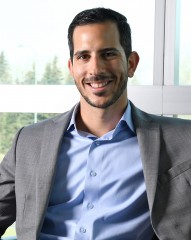Episode 48: Health Care for Newly Arrived Refugee Families
August 21st, 2016
 In this episode Dr. Gabriel Fabreau describes some of the clinical issues and needs for recently arrived refugee families in Canada. According to the United Nations High Commissioner for Refugees (Statistic 2015) there are 65.2 million individuals forcibly displaced worldwide and 51% are children. In 2015 Canada has committed to accept thousands of Syrian refugees fleeing the civil war. Between March and June 2016 Calgary has received 1500 Syrian refugees and another 510 are expected to arrive by the end of year.
In this episode Dr. Gabriel Fabreau describes some of the clinical issues and needs for recently arrived refugee families in Canada. According to the United Nations High Commissioner for Refugees (Statistic 2015) there are 65.2 million individuals forcibly displaced worldwide and 51% are children. In 2015 Canada has committed to accept thousands of Syrian refugees fleeing the civil war. Between March and June 2016 Calgary has received 1500 Syrian refugees and another 510 are expected to arrive by the end of year.
In Calgary there are many private sponsors, faith groups, and families who help refugees but are unaware of the existence of Mosaic (http://mosaicpcn.ca/Pages/default.aspx). This is a specialized multidisciplinary refugee health clinic that provides care, support and help to refugees, physicians and anyone who wants to know how to care for recently arrived families. And more help can be found at the Calgary Catholic Immigration Society (https://www.ccisab.ca/services/services-for/refugees)
“Caring for new refugees is not like caring for patients in the general population” Gabriel says. Compassion, patience, cultural competency training, and patient-centred care are paramount with this population. It is also incredibly important to use professional translation services to enable safe and high quality care. Furthermore, Gabriel explains the importance of avoiding general assumptions when diagnosing refugee patients who have received different care.
Finally, Gabriel discusses the evidence-based clinical guidelines for immigrant and refugees in Canada. He mentions some of the important areas and clinical entities for health in refugees. The primary health issue with refugees is infectious disease. He describes how to deal with documentation, vaccinations schedule, viral infection screening, intestinal parasites, and malaria. A second major component is mental health. Depression, post traumatic stress disorder, and anxiety disorders are common mental health issues among refugee patients that can appear immediately after arrival to Canada or in the following 6 -12 months. Another health issue is non-communicable diseases, such as hypertension, diabetes, coronary disease, and chronic obstructive pulmonary disease (COPD). And the last important health component is women’s health, specifically for young women who need support during their pregnancy, education on contraception, and assisted natal care.
After listening to this podcast, listeners will be able to:
1. Increase awareness around specialized health refugee clinics
2. Understand the clinical needs and issues of refugee patients
3. Learn about the Canadian evidence-based clinical guidelines for immigrant and refugees
Dr. Gabriel Fabreau is a Clinical Assistant Professor in the Departments of Medicine and Community Health Sciences at the University of Calgary and an active member of the O’Brien Institute for Public Health. Dr. Fabreau completed an academic fellowship jointly at Harvard Medical School in the Department of Health Care Policy and the Division of General Internal Medicine at the Brigham and Women’s Hospital, in Boston MA. He also completed a Master of Public Health program at the Harvard School of Public Health in the Clinical Effectiveness stream.
Dr. Fabreau’s clinical and academic interests focus on complex socially vulnerable populations, complex chronic disease, and high health system use. In line with these interests, he founded a General Internal Medicine-Primary Care shared care clinic in East Calgary, in one of Calgary’s lowest income neighbourhoods with the highest burden of unmet chronic disease. He also works clinically and directs a program of research at the Mosaic Refugee Health Clinic to better understand and manage the complex care needs for recently arrived refugees to Canada.
Read more:
Refugee references–
- Ruiz-Casares M, Cleveland J, Oulhote Y, Dunkley-Hickin C, Rousseau C. Knowledge of Healthcare Coverage for Refugee Claimants: Results from a Survey of Health Service Providers in Montreal. Kumar S, editor. PLoS ONE. 2016 Jan 20;11(1):e0146798–11.
- UNHCR. UNHCR Mid-Year Trends 2015 [Internet]. 2015 Dec pp. 1–28. Available from: http://www.unhcr.org/56701b969.html
- Hansen L, Maidment L, Ahmad R. Early observations on the health of Syrian refugees in Canada. Public Health Agency of Canada. March 2016 Available from: http://www.phac-aspc.gc.ca/publicat/ccdr-rmtc/16vol42/dr-rm42-s2/ar-03-eng.php
- Chung. Population Profile: Syrian Refugees. 2015 Nov 25;:1–18. Available from: http://lifelinesyria.ca/wp-content/uploads/2015/11/EN-Syrian-Population-Profile.pdf
- Lough S. Health agencies overwhelmed by Syrian crisis. Canadian Medical Association. 2015 Nov 3;187(16):1196–6.
- Nicolai T, Fuchs O, Mutius von E. Caring for the Wave of Refugees in Munich. N Engl J Med. 2015 Oct 22;373(17):1593–5.
- Redditt VJ, Graziano D, Janakiram P, Rashid M. Health status of newly arrived refugees in Toronto, Ont Part 2: chronic diseases. Can Fam Physician. The College of Family Physicians of Canada; 2015 Jun 30;61(7):e310–5.
- Redditt VJ, Janakiram P, Graziano D, Rashid M. Health status of newly arrived refugees in Toronto, Ont Part 1: infectious diseases. Can Fam Physician. 2015.
- Pottie K, Greenaway C, Feightner J, Welch V, Swinkels H, Rashid M, et al. Evidence-based clinical guidelines for immigrants and refugees. Canadian Medical Association. Canadian Medical Association; 2011;183(12):E824–E925.
- Canadian Collaboration for Immigrant and Refugee Health (CCIRH). Available from: http://www.ccirhken.ca/
- CCIRH e-Clinical Checklists for New Immigrants and Refugees. Available from: http://ccirhken.ca/ccirh_main/sample-page/page3-2/
- UNHCR. Global Trends – Forced Displacement in 2015. June 2016. Available from: https://s3.amazonaws.com/unhcrsharedmedia/2016/2016-06-20-global-trends/2016-06-14-Global-Trends-2015.pdf
- Government of Canada – Immigrations and Citizenship. #WelcomeRefugees: Canada resettles Syrian refugees. 2016. Available from:http://www.cic.gc.ca/english/refugees/welcome/index.asp
- Government of Canada – Immigrations and Citizenship. 2016. Interim Federal Health Program: Summary of coverage. Available from :http://www.cic.gc.ca/english/refugees/outside/summary-ifhp.asp

